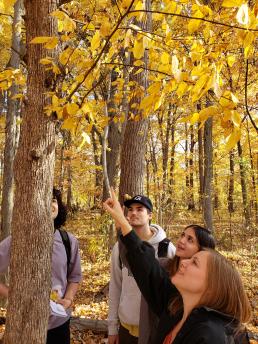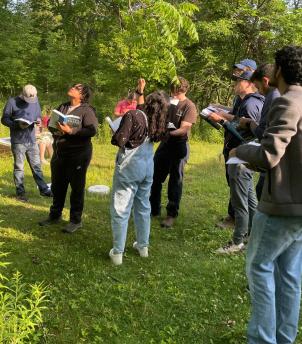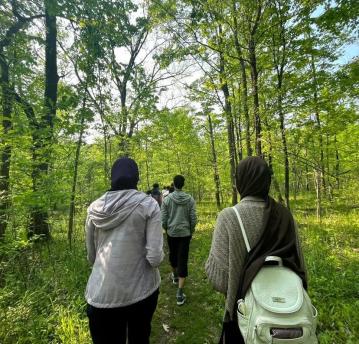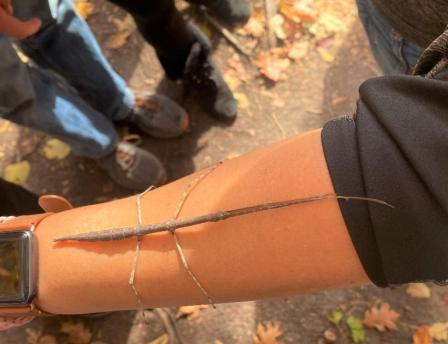For UM-Dearborn Students




One of the core components of the Center’s mission is to educate the future leaders of tomorrow about the regional and global environmental issues and concerns that will confront the citizens of Michigan in the 21st century. Thus, we emphasize experiential learning via coursework, field labs, undergraduate and graduate research, or student-led associations.
The diverse habitats of the Environmental Study Area provide a tremendous resource for on-site outdoor lab activities, such as plant, insect, and bird identification and classification, soil and water sampling and analysis of bacteria, nutrients, and heavy metals, geospatial analysis of landforms and waterways, and analysis of successional dynamics of aquatic and terrestrial habitats.
We also offer a wide range of opportunities for students interested in learning more about nature and sustainability and getting involved with the EIC.
UM-Dearborn Courses at the EIC
Biology 320: Field Biology
This class engages students in a semester-long outdoor study of living plants and animals in the 120-acre Environmental Study Area, which has a wonderful assortment of natural habitats to explore. Students are learning the practice of patient, in-depth field observation and identification of local flora and fauna. They keep and maintain daily logs and a field notebook of their observations. This is a wonderful opportunity for students to become knowledgeable and appreciative of the rich biodiversity of southeastern Michigan.
Attending biology classes in the EIC provided a unique and appropriate backdrop and opened to a whole natural classroom in which to explore and learn - Sarah Hudson
Independent Studies & Project Based Learning
Students can also partake in independent studies that will help further their education. Some studies that have been conducted in the past include tree surveys, studying plant diversity in the natural area, generating trail maps with GIS, and more.
Examples of University Student Projects:
- Augmenting management plans for historical landscapes with GIS: a case study of Henry Ford's Fairlane Lake
- Conducting a species inventory and geospatial mapping of deciduous forest trees.
- Estimating population densities and mapping the distribution of the invasive Common Buckthorn (Rhamnus cathartica).
- Monitoring diversity and abundance of turtles in Fairlane Lake.
- Assessing impacts of the invasive weed garlic mustard (Alliaria petiolata) on native plant diversity.
- Guide to Rose Garden Pond Insects
Connections to UM-Dearborn clubs and organizations
The EIC is connected to various clubs and organizations on the University of Michigan-Dearborn campus. These connections help form unique outdoor experiences and sustainability opportunities for students.
The Planet Blue Ambassador (PBA) program empowers all faculty, staff, and students to become engaged in sustainability and lead by personal action. Enroll in our self-paced Online PBA training offered through Canvas or sign-up for a live Group PBA Training to get connected with the information and resources available to help you work and learn sustainably at UM-Dearborn. You can also visit umdearborn.edu/sustainability to learn more about campus sustainability initiatives!
Nature Walks for Mental Health are a collaboration with the Counseling and Psychological Services Peer Educators (CAPS), Planet Blue Ambassadors, and Sustainability Programs Coordinator Grace Maves. Initiated by EIC Student Naturalist Alexis Kott in 2022, the Nature Walks consist of a 30-45 minute relaxing walk in the Environmental Study Area with brief guided meditations led by CAPS peer educations, such as Brianna Mejia-Hans.
The EIC works closely with student-led environmental organizations such as the UM-Dearborn Student Sustainability Coalition (SSC). These collaborations have facilitated various volunteer opportunities, meetings, and events for student groups. For example, the SSC held a plastic bottle drive in 2023 and promoted recycling efforts on campus.
